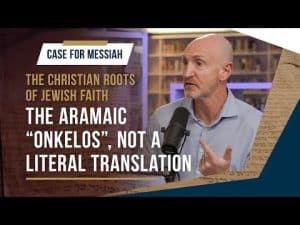Is the purpose of the New Testament (NT) to tone down the law? To make our lives easier? So that we can do whatever we please, since we'll receive forgiveness anyway?
Or, in other words, does the NT cancel the law and give permission to sin?
Before we answer this claim, it's important to clarify: When the Rabbis use the word “Torah” they're not referring to Moses' commands, but to the commands of the rabbinical tradition, invented by the Sages thousands of years after Moses' time. See for example the introduction to a book by a famous Orthodox Jewish writer Chaim Shimmel in his book The Oral Law:
“Jews never followed the actual words of the Torah, but lived according to the Rabbis’ traditions, who believe that God gave to Moses an additional law at Sinai: The Oral Law.”
(We've dedicated a separate video and article to the myth of the “Oral Law”. You can watch / read it here.)
Does the New Testament really make the lives of its followers easier?
What do you think is easier? Keeping outward traditions and ceremonies like putting a piece of fabric on your head (a yarmulke)? Wrapping a leather strap around your arm (tefillin)? Or not tearing toilet paper on Sabbath; Things that don't really concern our heart, our relationships, or help us love our neighbor better?
OR …
the deep reaching “heart surgery” that Jesus and the NT call for in order to instill a living spirit in our hearts of stone?
In the NT Jesus tells us to even love our enemies and to give our resources to the poor. You need to understand, the NT doesn't make things easier. On the contrary, the standard is higher.
According to the NT, from God's perspective all these habits and external ceremonies that our tradition develops and dictates don't impress him at all. Also, they do not cause us to love or help our neighbor more. Our natural inclination is to do good and help others because we think that God then will owe us a favor or others owe us when we need help. But these are selfish motives that actually serve ourselves. That's not true love.
What is the only true motive for good deeds?
Love.
When God did the most worthy act, he showed us his love when he appeared to us in the Messiah and gave his life even unto death so that we could have forgiveness of sin. Therefore, it is just a natural expression that following God's example in what he did for us, we too should lend a hand, loving and helping our neighbor. Not as someone who owes to others, not out of fear or constraint but rather as an expression of love towards God according to the example that he gave us in Jesus.
The truth is, that in the OT times just like today, the people of Israel were so far removed from God that God stated:
“Your new moons and your appointed feasts my soul hates…” (Isaiah 1:14)
God is not interested in our ceremonies, the candles we light, the dreidels that we spin, or the meal that we skip once a year. He's interested in our heart, our relationship to our neighbors and to his creation.
According to Jesus, what defiles us is not what enters our mouth but what comes out of it.
Our mouth is like a mirror to what happens in our heart – our thoughts. For that reason, Jesus said:
“Do you not see that whatever goes into the mouth passes into the stomach and is expelled? But what comes out of the mouth proceeds from the heart and this defiles a person. For out of the heart come evil thoughts, murder, adultery, sexual immorality, theft, false witness, slander. These are what defile a person. But to eat with unwashed hands does not defile anyone.” (Matthew 15:17-20)
According to Jesus, our words, just like our outward deeds, are the fruit of what occurs in our heart. For example, fornication, rape or adultery are an outward expression of the sin within our hearts, the lust in our thoughts. Therefore he taught:
“Everyone who looks at a woman with lust has already committed adultery with her in his heart.” (Matthew 5:28)
Jesus raises the bar.
Jesus' moral understanding of the law is by far more rigid than any rabbinic interpretation. But here comes what is so special about Jesus. On one hand, Jesus reinforces and raises the moral standards of the law. Yet, on the other hand he also increases grace – a standard of grace and mercy that is hard to live up to. Not lower than the moral standard that he sets.
“You have heard that it was said, ‘An eye for an eye and a tooth for a tooth.’ But I say to you, do not resist the one who is evil. But if anyone slaps you on the right cheek, turn to him the other also. And if anyone would sue you and take your tunic, let him have your cloak as well. And if anyone forces you to go one mile, go with him two miles. Give to the one who begs from you, and do not refuse the one who would borrow from you.” (Matthew 5:38-42)
In ancient middle eastern culture, and unfortunately until today, the pride of man brought about a vicious cycle of endless retaliation. Retaliation after retaliation after retaliation after retaliation. Jesus commanded us to put an end to this. But how? Through grace.
With the commandment “an eye for an eye, a tooth for a tooth”, God taught Israel that the life of everyone has value. For example, a slave's eye was not of less worth in God's sight than a king's eye. But the religious tradition interpreted this in a different way, as a permission to retaliate. This leads to an endless cycle of retaliation. Bloodshed that leads to more bloodshed that leads to more bloodshed.
Jesus tells us: “Enough! Stop getting revenge.” It's impossible to appease people with revenge. It's impossible to cast out darkness with more darkness. Only light casts out darkness. Only love will appease people. Not revenge. How? By showing them grace.
Let's face it, this does not sound simple and easy at all. It's a lot more challenging than kissing a mezuza or not eating a cheeseburger, isn't it?
But wait.
It becomes even more complex.
Because Jesus doesn't only ask us to love those who love us too, but even those who hate us. The rabbinical tradition teaches that you should love your neighbor as yourself, referring only to Jews that keep the law.
Jesus, however, commands us to show grace and love to everyone – also to the Gentiles, and even to those who hate us.
“You have heard it said, ‘You shall love your neighbor and hate your enemy.’ But I say to you, love your enemies and pray for those who persecute you, so that you may be sons of your Father who is in heaven. For he makes his sun rise on the evil and on the good, and sends rain on the just and on the unjust. For if you love those who love you, what reward do you have? Do not even the tax collectors do the same? And if you greet only your brothers, what more are you doing than others?” (Matthew 5:43-47)
According to Jesus, if you were angry at your brother without cause, you killed him. Did you dream about another woman? You cheated on your wife.
Jesus does not make our life easier. On the contrary! He takes the Torah's high standards, makes them even harder, and proves to us that in reality, the tradition abandoned the Torah and toned down its commandments.
But Jesus does not want to make it harder on us in a legalistic and strict way. Rather, he wants our heart to change its perspective and be transformed.
As a result, we will love, serve and give from ourselves for others. Not out of constraint or fear, but out of love, appreciation, and because we are grateful for what He did for us.
Jesus is the example we need to follow. And while we should try to live up to the highest moral standard, we must remember that we are not called to judge others, but to love and show mercy. God is the ultimate judge, not us.
See what Paul the Apostle says in the NT.
“Now the law came in to increase the trespass, but where sin increased, grace abounded all the more, so that, as sin reigned in death, grace also might reign through righteousness leading to eternal life through Jesus Christ our Lord. What shall we say then? Are we to continue in sin that grace may abound?
By no means!
How can we who died to sin still live in it? Do you not know that all of us who have been baptized in Jesus Christ were baptized into his death? We were buried with him by baptism into death, in order that we too might walk in newness of life just as Christ was raised from the dead by the glory of the Father. For if we have been united with him in a death like his, we shall also be united with him in a resurrection like his. We know that our old self was crucified with him so that the body of sin might be brought to nothing, so that we would no longer be enslaved to sin. For one who has died has been set free from sin. Now if we have died with Christ, we believe that we will also live with him.
We know that Christ, being raised from the dead, will never die again; death no longer has dominion over him. For the death he died he died to sin, once for all, but the life he lives he lives to God. So you also must consider yourselves dead to sin and alive to God in Christ Jesus. Let not sin therefore reign in your mortal body, to make you obey its passions. Do not present your members to sin as instruments for unrighteousness, but present yourselves to God as those who have been brought from death to life, and your members present to God as instruments for righteousness. For sin will have no dominion over you, since you are not under law but under grace.
What then? Are we to sin because we are not under law but under grace? By no means!” (Romans 5:20-6:15)
In other words, the NT rules out every permission to sin.
It's important to understand also how the Sages admitted that the law of the Messiah will be different than Moses' law.
See what's written in the Talmud:
“In the future the Lord, will sit in the Garden of Eden, and preach and all the righteous will sit at his feet. And the Lord will sit and teach a new law that will be given by the Messiah.” (Yalkut Shimoni on Isaiah 26)
To sum it up, since the Sinai covenant, we were under Moses' commandments, but now in the new covenant, we are under the commandments of the Messiah.
And our lives? They do not become easier. On the contrary, they are a challenge. But also a lot more satisfying, since we are not ruled by fear or constraint but by love and grace.














